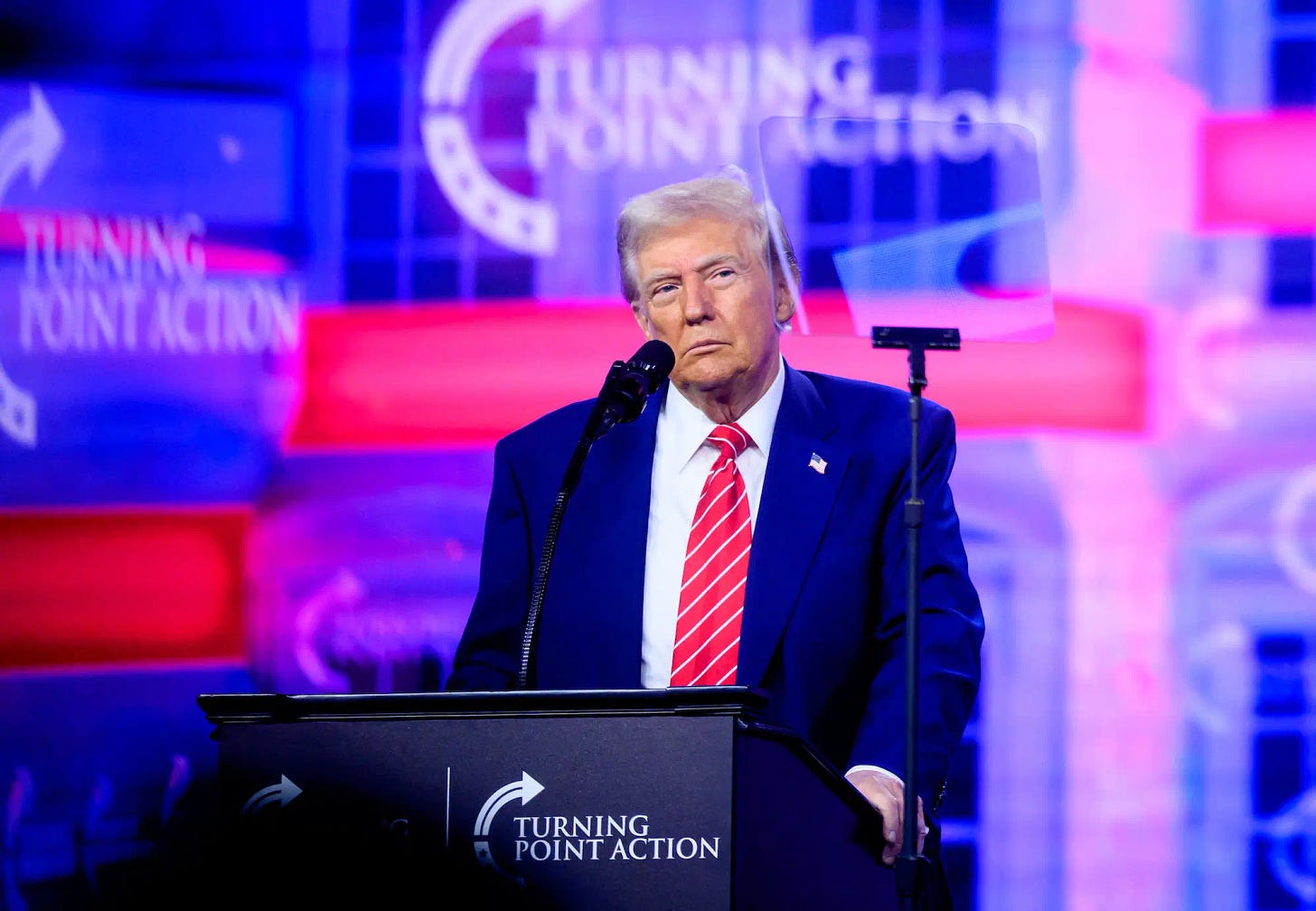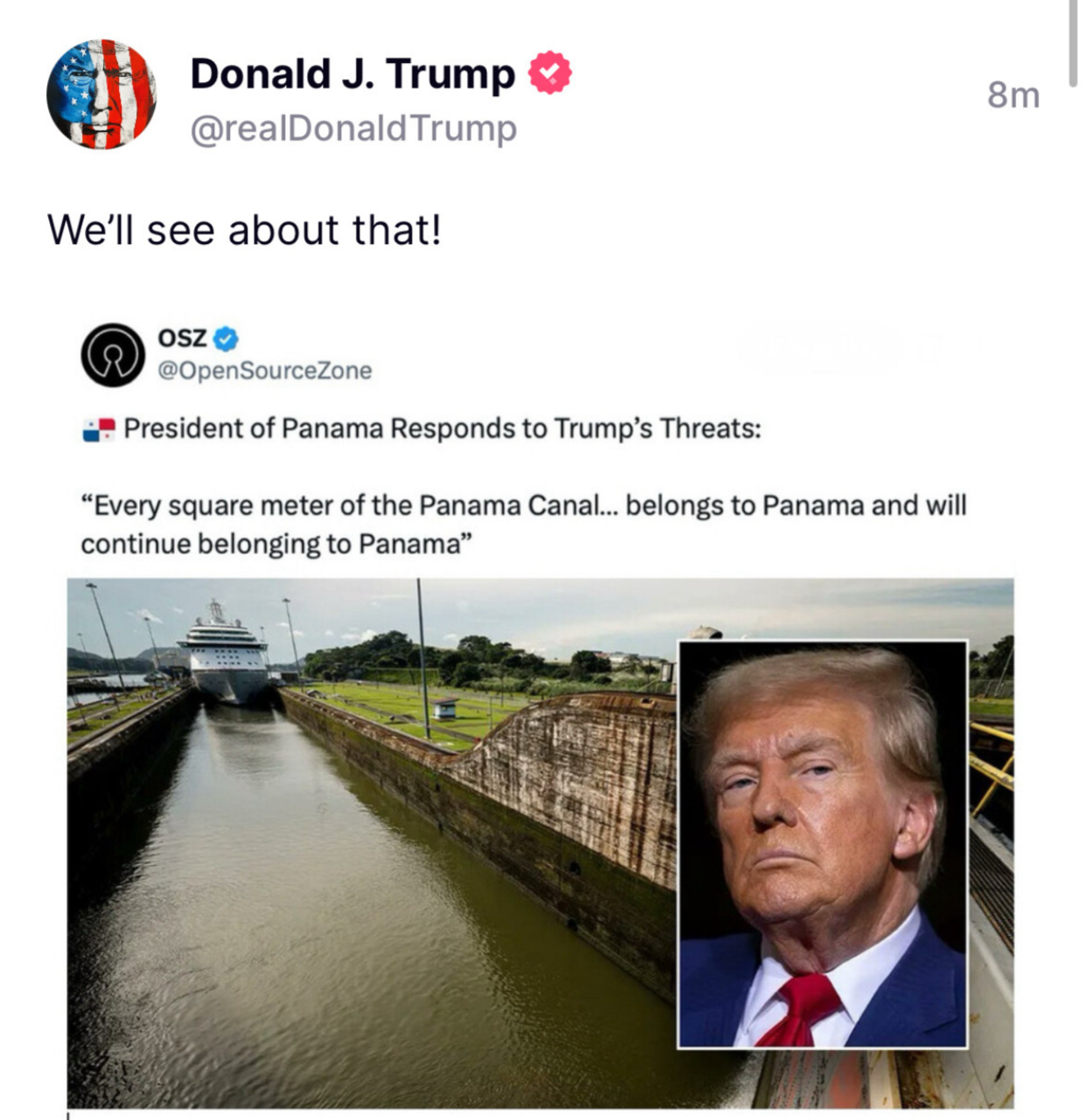We’re So Sorry about This
In the last 24 hours, Trump has made threats upon both Panama and Greenland, and yeah, it’s both weird and bad.

After goading Canada about annexing it as a 51st state and warning Mexico we could attack it to interdict the flow of drugs from cartels, Trump has targeted (checks notes) the nation of Panama over its canal and the island of Greenland, once again.
Admittedly, neither of these things was on my geopolitical bingo card. On their surface they are patently absurd, but at the same time we have to take them seriously. It’s a strange and distressing feature of the incoming administration.
On Sunday, Trump first put out a pair of statements on Truth Social claiming that the U.S. could demand that the Panama Canal be returned to the United States and that it was foolish for President Jimmy Carter to have given it away. He warned against U.S. vessels being charged “exorbitant prices and rates of passage” and falsely suggested that China was managing it and the U.S. would never let it fall into “the wrong hands.”
Four hours earlier, Trump had also buried an alarming one-liner near the bottom of his announcement of his ambassador to Denmark, one that few at first noticed: “For purposes of National Security and Freedom throughout the World, the United States of America feels that the ownership and control of Greenland is an absolute necessity.”
It’s something of a fool’s errand to try and predict or explain Trump’s behavior, especially toward our own neighbors and allies. But I can offer some context and observations.
A man, a (concept of a) plan, a canal, Panama
No one knows exactly why Trump decided to pick this particular fight yesterday. The Panama Canal has belonged to Panama for 25 years after a treaty with the U.S. returned the canal to Panamanian ownership and control. But because of our troubled and sometimes violent history with that nation, we cannot dismiss Trump’s recent threats lightly.
By way of background, in the early 20th century the U.S. acquired rights to build and operate the Panama Canal. It did so, however, through a treaty that the Colombian senate actually refused to ratify. At the time, Panama was in the process of seceding from Colombia, and President Teddy Roosevelt supported that separatist effort with control of the geopolitically strategic canal in mind.
The chief negotiator for Panama apparently operated without formal approval from its government, and many questioned the validity of the treaty. Tensions grew in 1964 as riots broke out over the rights to the canal, and negotiations began for a new treaty. But a coup interrupted those talks, and Henry Kissinger told Gerald Ford in 1975, “If these [Canal] negotiations fail, we will be beaten to death in every international forum and there will be riots all over Latin America.” In the end, two governing treaties, one covering neutrality of operations and one returning the canal to Panama at the end of the 20th century, were signed and then ratified in the Senate after protracted political battles.
You may also recall that, after tensions between the countries grew again in the 1980s, President George H.W. Bush ordered an invasion of Panama in December of 1989, in a brazen show of American militarism and interventionism. Bush removed Manuel Noriega from power. Since that time, relations normalized, and the canal was returned to Panama as promised in 1999.
Lately, drought conditions have made it more difficult and costly for the canal to operate its lock system, which relies upon fresh water to raise and lower ships for passage through the canal. But there’s been nothing to suggest that U.S. vessels have been targeted for higher prices or rates. In fact, such price discrimination would violate the “neutrality” part of the treaty.
So where does Trump get the idea that “China” is managing the canal and that it could “fall into the wrong hands?” There have been some unfounded claims that the Chinese are seeking to establish “de facto control over the porting industry around the canal” because a Hong Kong based private shipping company (Hutchison Whampoa) applied successfully for 25 year lease renewals of its ports there. But there is no evidence that this establishes some kind of “indirect control” over the canal by the PRC. Indeed, the ports have nothing to do with the canal. Ships that traverse the canal don’t even have to use the ports, unless cargo was exported or imported by Panama.
Agitators on the far right nonetheless claim that Panama should be targeted for allowing migrants from South America to pass through its territory on their way north, specifically through the extremely treacherous Darién Gap—described as a “lawless wilderness on the border of Colombia and Panama, teeming with everything from deadly snakes to antigovernment guerrillas.”
Trump’s pal Laura Loomer went down to Panama in February of this year and made false and inflammatory claims about the migration issue, seeking to tie it somehow to China. She wrote,
It’s incredible to think that because the US turned over the Panamá Canal to Panama, NGOS and the [Office of International Migration], which is largely influenced by China, is now operating out of an old US military base to facilitate the invasion of the United States.
Just another reason why we should take back the Panama Canal and shut down the NGOS in the City of Knowledge, where the former US military base is located.
Loomer added, “Taking back the Panama Canal should be a core initiative as it relates to securing our border and stopping the INVASION of the United States!”
Loomer claimed yesterday on Twitter, “Very happy to see President Trump is suggesting that he will take back control of the Panama Canal.” She boasted, “When I traveled to Panama in February, I called on President Trump to take back control of the Panama Canal and suggested it to him in person.”
It’s also plausible that, Trump being Trump, he may simply be out for revenge against the Panamanian administration. A few years back, toward the end of Trump’s first term, the Trump Companies were accused of tax evasion over nonpayment by the Trump Ocean Club in Panama. It was an ugly row, and Trump was reportedly angry that the Panamanian government didn’t help his staff from being evicted when another group bought the building. All this could therefore just be payback.
Whatever the reason for Trump’s current threats, the Panamanian president, José Raúl Mulino, was having none of it. “Every square meter of the Panama Canal and the surrounding area belongs to Panama and will continue belonging so,” Mulino stated.
“We’ll see about that!” Trump later responded.
A third view is that Trump is trying to distract from the story that he is not in charge, but rather his top donor, Elon Musk, is. There may be some truth to this, and there’s always the risk in reporting on Trump that you wind up feeding the beast. But given 1) where he could be getting these crazed ideas, and 2) the history of U.S. military interventionism in Panama, we can’t afford to look away and say nothing about these threats, as if they carry no weight or consequences.
Trump is seeing Green
On a separate but related note, Trump is rattling U.S. sabers again over ownership of Greenland, which belongs to the nation of Denmark. You may remember that Trump has a strange obsession with the island, having floated the idea to offer to buy it from Denmark during his first term.
That created a diplomatic firestorm at the time. According to reporting by the Wall Street Journal, Trump raised the idea of buying the largely ice-covered, self-ruling part of the island during “meetings, at dinners, and in passing conversations.” His interest in Greenland grew, apparently, after he heard about the nation’s vast mineral resources.
Those resources include huge deposits of rare earths around the town of Narsaq, population 1400, which has improbable strategic importance. As NPR reported,
The craggy hills surrounding the town are estimated to hold about a quarter of the world's rare earth minerals. With names such as cerium and lanthanum, rare earths contain key ingredients used in many of today's technologies—from smartphones to MRI machines, as well as electric cars and military jets.
Denmark of course is a member of NATO already, having joined the military alliance in 1949. So Greenland’s natural resources, including those rare earth deposits, are already protected by the Western alliance. Trump’s declaration that the island should belong instead to the United States will further strain relations with Denmark and our allies in general. It signals a distrust of NATO and draws some kind of distinction between Denmark’s control and U.S. control that doesn’t functionally yet exist.
During his first term, cooler heads were able to talk Trump out of continuing to press the issue of the U.S. acquiring Greenland. It’s now painfully unclear whether there will be any such guardrails in place after he takes power in January.
Given that Pete Hegseth’s nomination as Secretary of Defense is still proceeding to confirmation, he should be asked whether he believes the U.S. military should ever be deployed against peaceful nations in our hemisphere or against our own NATO allies. While this sounds a bit insane, it now seems we need to know where Hegseth stands on these questions.
In any event, on behalf of the sane people of the United States, I want to apologize to the people of Greenland and Denmark, and to the Panamanian people and their president. We tried to stop this kind of insanity last month, but we fell short.





It won’t matter what Hegseth *says* during his confirmation. SCOTUS has taught us that - once confirmed - he/they can and will promptly change their tune and do whatever they want. And no one will do anything to stop it.
We here in the top half of North America are pretty annoyed too. 51st state my a**!